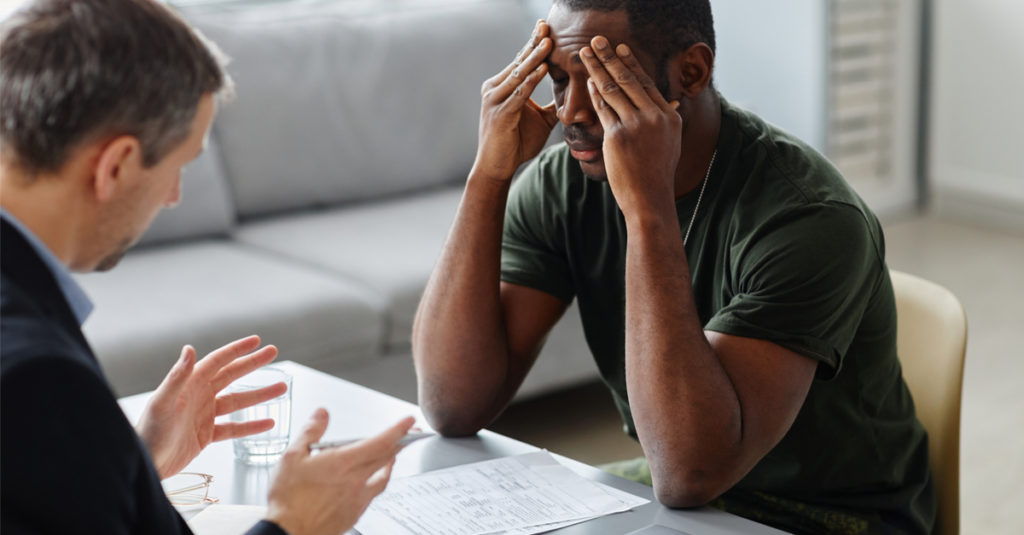
A serious car crash can leave a lasting impact, with unseen scars enduring long after your physical injuries have healed. If you are suffering from post-traumatic stress disorder (PTSD) after your wreck, our Charleston auto accident attorneys can help. We have experience handling cases like yours, and are equipped to provide legal representation you can count on. So if you have PTSD after a car accident, you have options for proper compensation.
Let us explain.
What is PTSD?
Post-traumatic stress disorder (PTSD) is a psychiatric disorder that stems from a traumatic event. Those suffering from PTSD have often experienced or witnessed serious accidents, war, physical violence, natural disasters, etc.
How Do I Get Compensation To Pay For My PTSD Treatment After A Car Accident?
Getting the compensation you deserve begins with filing a car accident claim. Your Charleston auto accident attorney can help, keeping you updated each step of the way as your case progresses. If the insurance company refuses to offer a fair settlement, your attorney will file an official lawsuit. If this path is pursued, here’s what you can expect:
6 Steps in Car Accident Lawsuit
- Being investigation
- Gather documentation
- Confirm who is at-fault
- Lawyer files your lawsuit
- Enter negotiations and receive settlement offer
- If settlement isn’t accepted, go to court
Difference Between PTSD After A Car Accident vs Regular Shock After A Car Accident
Most car accident victims feel overwhelmed after their accident. But if strong feelings of anxiety and distress persist or intensify over time, you may be experiencing post-traumatic stress. Consult your doctor if you are plagued by any of the following symptoms:
- An ongoing, overall feeling of uneasiness
- Irritability or excessive anger
- Persistent worrying
- Anxiety about driving or riding in vehicles
- Nightmares or trouble sleeping
- Feeling of disconnection from others
- Ongoing, uncontrollable memories of the accident
- Fear of having medical tests or procedures performed
Types of Symptoms of PTSD After A Car Accident
PTSD is not a one-size-fits-all diagnosis. Symptoms may present in different ways, including the following:
- Intrusion: Intrusive thoughts include memories, dreams or flashbacks that repeat uncontrollably. They are often vivid and intense, causing PTSD sufferers to virtually relive the incident over and over.
- Avoidance: To cope with the trauma, some people with PTSD avoid people, places, situations, etc. that remind them of their incident – and may trigger painful memories.
- Alterations in cognition and mood: Significant trauma may distort thoughts and beliefs, especially those pertaining to oneself. PTSD sufferers may begin to blame themselves and question their beliefs. They may also lose interest in activities they once enjoyed and find it difficult to feel positive emotions.
- Alterations in arousal and reactivity: These changes include irritability and sudden angry outbursts, reckless behavior, trouble sleeping or focusing, hypervigilance and more.
Types of PTSD Treatment After A Car Accident
Keep in mind that not everyone who endures trauma develops PTSD. Among those who do, symptoms may fade over time, making professional treatment unnecessary.
If psychological help is needed, early intervention improves the rate of recovery. The earlier the symptoms are recognized, the more treatable the condition. Talk therapy combined with medication is often effective in treating PTSD.
Here are some helpful steps to take in recovering from PTSD:
- Talk to trusted friends, family members, or a counselor. It may be helpful to recount the details of your accident, explaining what you felt and thought during and after the traumatic event.
- Stay physically active. Participating in activities that don’t impact your healing process can help you return to your normal life. Consult your doctor to see which activities are safe.
- Follow up with your family doctor. Your physician may continue to monitor your progress themselves or they may refer you to a medical specialist or therapist.
- Try to resume daily routines. Serious accident injuries may affect your physical capabilities, but as you heal, do your best to slowly get back to your everyday activities. While it may seem scary at first, this is a crucial part of healing.
- Learn defensive driving skills. Car accident victims who develop PTSD often find it difficult to drive or even ride in cars – but defensive driving can help prevent accidents in the future. Be sure to buckle up, avoid distractions or drowsy driving, and focus on the road ahead.
Injured After A Car Accident? Discover A Trusted Charleston Car Accident Lawyer Near Me
If you have been hurt in a car crash, Hoffman Law Firm can help. Attorney David Hoffman and his Charleston car accident lawyers provide trusted legal representation and support when you need it most, working diligently to get you the compensation you deserve. Let us handle your accident claim from start to finish, so you can focus on recovering from your accident injuries.
Our personal injury law firm offers trusted legal advice in a wide variety of cases here in the Lowcountry, including:
Personal injury
Car Accident
Truck Accident
Motorcycle Accident
Workers’ Comp
Wrongful Death
Longshoreman & Maritime
Medical Malpractice
Dog Bite
Brain Injury
Spinal Cord Injury
Defective Product
Nursing Home Abuse
When seeking a skilled Charleston car accident lawyer near me, choose Hoffman Law Firm. We are ready with your initial free consultation today!
